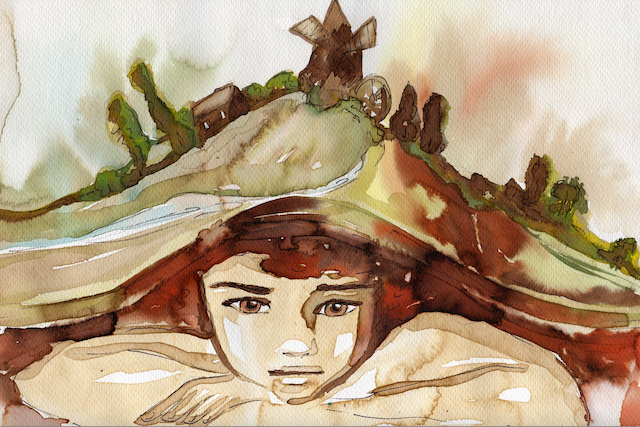
“Sometimes people wound us because they’re wounded and tell us we’re broken because that’s how they feel, but we don’t have to believe them.” ~Lori Deschene
I’ve always been proud of how I can handle life so well. I’m great at managing responsibilities and taking care of others, but I’m not so great at being aware of my own needs. It’s part of being a highly sensitive individual and growing up with parentification trauma.
Overcoming parentification can take years. If you’re like me, you might not even realize it’s something you experienced until you’re well into adulthood. More people should know about this form of trauma to process it and thrive beyond its reach.
What Is a Highly Sensitive Person?
Knowing how our brains process interpersonal relationships is essential to understanding how we can heal from things.
I grew up with a mom who was quick to remind me that I felt things very deeply. I was always the first member of my family to cry when I was happy and get sad about upsetting events.
Certain textures, light sources, and noise levels also made me uncomfortable, even when others were fine. Feeling a suede couch under my legs made my skin crawl. Ceiling lights gave me anxiety, and the microwave beeping triggered my flight-or-fight instinct.
I learned about highly sensitive individuals when I started going to therapy after college. They’re people like me—we’re more easily stimulated by our environment and perceive things more deeply on instinct. Emotions become magnified in our hearts, and we may have more empathy for others than our relatives.
Although researchers can identify some genetic markers in highly sensitive people (HSPs), environmental factors also play a role in our emotional processing.
What does parentification have to do with HSPs? Let’s dive into what that specific trauma is before connecting it to our more sensitive minds.
What Is Parentification?
Parentification is a toxic family dynamic.
I experienced the instrumental version of it when my younger brother was born. When my mom needed more help around the house, our family roles reversed. She asked me to clean, cook meals, and do yard work while she watched my brother or went to work.
I was only eight years old.
There’s also the emotional side of parentification. Emotionally immature parents might treat their child as a confidant or counselor. Sharing too much information or burdening their kid with heavy emotions may be challenging for them to process.
We live with the effects of either or both types of parentification in adulthood, even if we don’t realize it. I dealt with the impacts before I even knew there was anything to overcome, but getting professional help made starting the hard work possible.
What Can Cause Parentification?
Numerous home videos on chunky VHS tapes in my basement prove that my parents were so excited to have me. How can parents go from desperately wanting to love a baby to raising them in a traumatic family dynamic?
Unfortunately, there are numerous reasons why parentification happens. Our parents may have grown up in households where they didn’t learn tools to process their emotions healthily. Their parents might have demonstrated emotional parentification and unknowingly taught them a future parenting style.
They might have been in an abusive relationship once, lost a loved one to an illness, or cared for someone with an addiction.
They could also have experienced trauma that they never processed. Instead of talking with a therapist or accepting their feelings, they could have repressed their emotions and taught themselves an unhealthy way to model emotional intelligence.
We might not always get answers, either. My parents don’t talk about their lives before my brother and I arrived. I might never know what caused their emotional parentification, which takes work to accept.
What Is Adaptive vs. Destructive Parentification?
Adaptive parentification is a short-term form of this dynamic. If you live with your dad and he’s injured in a car accident, he might be unable to walk for a week. During that time, you cook for your siblings and help them with their homework.
In that case, you’d take on parental responsibilities that are inappropriate for your age, but it would be for a limited time.
Destructive parentification is when this dynamic happens long term. The violation of your childhood and emotional boundaries remains constant, leading to adverse effects that can last a lifetime.
What Are the Effects of Parentification?
Although I highly recommend finding a therapist specializing in trauma and family dynamics, you don’t have to wait for an appointment to reflect on your past. These are a few signs you were parentified as a child that you might never have considered.
1. Being Overly Attentive to Responsibilities
Becoming responsible for someone else at a young age can make us overly attentive to survival needs. When I started caring for my mom and brother at eight years old, I learned that if I didn’t keep up with meals and laundry, my family wouldn’t eat or have clean clothes.
Our HSP minds start becoming anxious about the ramifications when we fall short, have a bad day, or forget something on our to-do list. As a result, one of the effects of parentification for me was never snapping out of survival mode.
I struggle to reserve time to relax in the evenings. Sometimes it’s even hard to recognize my own physical or mental needs. If my college roommates weren’t keeping up with our apartment chores, I’d vacuum and do dishes even if my bladder was painfully full or I hadn’t eaten all day.
Putting others’ needs before your own at all times isn’t a healthy way to live. It’s also never fun to feel annoyed when someone tells me to relax or get anxious when I have free time. We deserve to care for ourselves and unwind just like everyone else.
2. Living with One or More Addictions
People raising kids with an unhealthy parentification style may say, “That’s not what you feel” when their child expresses anger at an upsetting situation. They may accuse the kid of getting angry for no reason and not respond until they let things go.
I lived through those experiences for years. The saddest part is how my anger, justified or not, had nowhere to go. It turned inward, creating a never-ending cycle of self-criticism and hatred.
As I got older, the self-hatred developed into an eating disorder. Other people start self-harming or using addictive substances. Sometimes the coping mechanisms help release negative emotions, but they’re ultimately only self-destructive.
Overcoming parentification might mean recognizing unhealthy coping styles and learning to recognize the scary emotions waiting underneath them. Guidance from a licensed therapist makes processing and healing possible.
3. Dissociating for Varying Periods
Parentification comes with triggers. My mom became passive-aggressive when I failed to predict what she wanted me to do, so now signs like sarcasm and subtle digs can make my mind freeze. When my thoughts stop and my body goes numb, dissociation begins.
Dissociating is a way our minds cope with traumatic stress. It allows us to disconnect from uncomfortable feelings or situations because our brain wants to protect itself. People don’t always develop dissociative tendencies while living with parentification, but it’s a potential effect.
When I lived at home, sometimes these dissociative periods would last a few hours or an entire day. I couldn’t recall getting home from school or doing anything until I went to bed, even though I had finished everything for the day.
Now that I’m out of that environment, my mind starts dissociating when I’m triggered by the mannerisms my mom had. I can also experience it before or during a visit with her.
4. Living with Anxiety
Whether you dealt with instrumental or emotional parentification, you could have resulting social anxiety. I get anxious in certain settings because I instinctively try to predict others’ needs. I’m constantly evaluating what’s safest to discuss or changing environmental factors, like closing blinds by the dinner table before the sun sets so it doesn’t shine in my friend’s eyes.
We could fear retribution based on how our parents responded during childhood or worry about causing even a minor upset in a relationship. Eventually, that anxiety can also direct inward and affect our self-worth.
Anxiety can also cause us to push our feelings away. Being good at compartmentalizing is one of the signs you were parentified as a child. Becoming anxious about feelings can result in years of ignoring the pain we need to process.
5. Repeatedly Getting into Unhealthy Relationships
Kids learn social skills from interacting with their parents. One of the effects of parentification is developing unhealthy future relationships based on those formed with parents.
This has affected my connections with friends and partners. I’ve unknowingly formed unhealthy attachments that can start in a positive place, but eventually, it always feels like I exist to fix their problems. They’re always using me as an advice machine or to care for them like a pseudo-parent.
Here’s an example if you’re not sure this applies to you.
I met a friend in high school, and we became close. Later, we went to the same college and became roommates. We’d been friends for so long, it felt smarter than rooming with strangers.
About a month after moving in with her, I noticed her behavior changed in ways that violated my boundaries. She expected me to do the dishes, clean up after her boyfriends, and pay all the bills for our apartment. There was always an excuse that sounded legitimate, but it made me feel like I had become her mom.
However, I put up with it for a year. I could never enforce my boundaries because the parentification stress of not perfectly caring for my family kept me in silent fear. I felt unseen and worthless, so I had to rebuild my self-worth when we moved out the following summer.
My friend had never treated me like that before we were roommates. While there were things we both could have done differently after moving into that apartment, I couldn’t get myself out of that unhealthy relationship due to parentification trauma. It can trap us in toxic dynamics with friends and partners, even when we can recognize an unjust situation.
Is Parentification Abuse?
Parentification might not result in physical beatings, but it’s still abuse. It mentally and emotionally takes advantage of kids.
It violates our boundaries by removing our right to have childhoods and handle responsibilities appropriate for our ages. Parentification may override our boundaries in ways that make us feel unable to say no to certain requests.
Parentification can also cause neglect, which is another form of abuse. Our parents fail to provide for our basic needs as children with no power or autonomy.
The psychological wounds can last through adulthood. They did for me. The effects harm our future relationships and self-worth, ultimately deteriorating our quality of life if we don’t get help to process our history.
Tips for Overcoming Parentification
The good news is that parentification doesn’t have to influence your mind and relationships forever. Here’s what I did to start reversing the damage.
1. Find a licensed therapist.
People experience the effects of parentification in adulthood in various ways. If we could reverse those effects ourselves, very few of us would even be talking about that kind of trauma.
I found a licensed therapist specializing in family trauma when I came to peace with the idea that I couldn’t repair the damage through sheer willpower. She knew how toxic dynamics like parentification affect a child’s development and therapeutic ways to process my past.
Talk therapy helped me get comfortable discussing my traumas. When I was ready, we started eye movement desensitization and reprocessing (EMDR) therapy through tapping and bilateral stimulation noises. Although EMDR recalled specific emotional pain, giving myself space to finally feel my compartmentalized feelings and deconstruct them with a therapist allowed me to heal.
Connect with a therapist to talk about how they can help you. They may recommend a similar treatment path or resources like dialectical behavior therapy (DBT). It depends on their training and your specific experiences.
2. Listen to your physiological needs.
My therapist also showed me how I don’t listen to or honor my mental and physical needs. I don’t let myself feel sad when I’m hurt or rest when I’m tired.
We developed strategies so I know how to recognize those feelings. I also have resources at home for self-care, like asking my partner for help and doing evening activities that don’t center around a survival responsibility. I enjoy embroidery and baths with lavender bath bombs because I learned to invest time in myself.
Not feeling worthy of tending to your needs is one of the effects of parentification. Therapy and journaling help reverse that. They become essential stress management tools that ultimately build your self-worth and self-esteem.
You may also work with a doctor or nutritionist to get assistance with coping mechanisms like recovering from an eating disorder or addiction if those are part of your history.
3. Prioritize your self-care.
I used to fully support the idea of self-care for other people, but I never thought it applied to me. My therapist taught me how to give myself the freedom to relax, have fun, try new hobbies, and move on to other ones.
Overcoming parentification requires believing in yourself, which may call for processing specific traumas. When you start recognizing how your brain works, you can use self-care habits to support your healing from those unhealthy inner dynamics.
My experience with parentification taught me that I existed to take care of others. Therapy showed me that I’m on this planet to experience joy and that I experienced a childhood injustice. Accepting that made giving myself breaks in the evenings or leaving responsibilities for another day easier.
If I deserve to thrive, I deserve to rest. This was processing that had to happen before I could enjoy self-care activities without guilt or anxiety.
You can reach the same point with help from a therapist. You’ll learn to support yourself and become your biggest cheerleader as you determine how you like to relax and have fun.
Defeat Parentification in Adulthood
Parentification can make us feel erased and worthless. It’s a childhood trauma that people don’t often realize is harmful, but it doesn’t have to influence your quality of life forever.
Connect with a therapist and they’ll show you how to rebuild yourself. You’ll start overcoming parentification by processing your past. Remember that even when it hurts, you can make things better.
You don’t have to earn your healing. You only have to take the first step forward by asking for help.
About Beth Rush
Beth is the mental health editor at Body+Mind. She has five-plus years of experience writing about behavioral health, specifically mindfulness-based cognitive therapy. Beth also writes about the power of human design to reveal our full potential and purpose. You can find her on Twitter @bodymindmag. Subscribe to Body+Mind for more posts by Beth Rush.













 Though I run this site, it is not mine. It's ours. It's not about me. It's about us. Your stories and your wisdom are just as meaningful as mine.
Though I run this site, it is not mine. It's ours. It's not about me. It's about us. Your stories and your wisdom are just as meaningful as mine. 